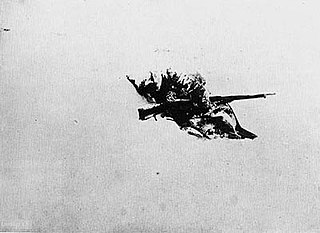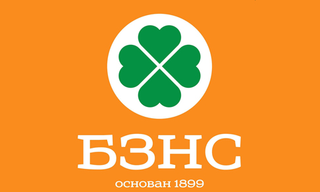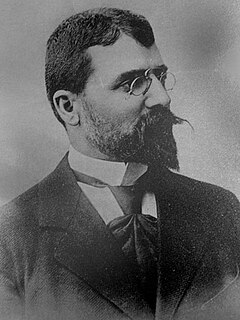
The Balkans, also known as the Balkan Peninsula, is a geographic area in southeastern Europe with various definitions and meanings, including geopolitical and historical. The region takes its name from the Balkan Mountains that stretch throughout the whole of Bulgaria from the Serbian-Bulgarian border to the Black Sea coast. The Balkan Peninsula is bordered by the Adriatic Sea on the northwest, the Ionian Sea on the southwest, the Aegean Sea in the south and southeast, and the Black Sea on the east and northeast. The northern border of the peninsula is variously defined. The highest point of the Balkans is Mount Musala, 2,925 metres (9,596 ft), in the Rila mountain range.
The history of Bulgaria can be traced from the first settlements on the lands of modern Bulgaria to its formation as a nation-state and includes the history of the Bulgarian people and their origin. The earliest evidence of hominid occupation discovered on what is today Bulgaria date from at least 1.4 million years ago. Around 5000 BC, a sophisticated civilization already existed and produced some of the first pottery and jewelry in the world. After 3000 BC, the Thracians appeared on the Balkan peninsula. In the late 6th century BC, most of what is nowadays Bulgaria came under the Persian Empire. In the 470s BC, the Thracians formed the powerful Odrysian Kingdom, probably after the Persian defeat in Greece, which subsequently declined and Thracian tribes fell under Macedonian, Celtic and Roman domination. This mixture of ancient peoples was assimilated by the Slavs, who permanently settled on the peninsula after 500 AD.

The Second Balkan War was a conflict which broke out when Bulgaria, dissatisfied with its share of the spoils of the First Balkan War, attacked its former allies, Serbia and Greece, on 16 (O.S.) / 29 (N.S.) June 1913. Serbian and Greek armies repulsed the Bulgarian offensive and counter-attacked, entering Bulgaria. With Bulgaria also having previously engaged in territorial disputes with Romania, this war provoked Romanian intervention against Bulgaria. The Ottoman Empire also took advantage of the situation to regain some lost territories from the previous war. When Romanian troops approached the capital Sofia, Bulgaria asked for an armistice, resulting in the Treaty of Bucharest, in which Bulgaria had to cede portions of its First Balkan War gains to Serbia, Greece and Romania. In the Treaty of Constantinople, it lost Edirne to the Ottomans.

The Internal Macedonian Revolutionary Organization was a revolutionary national liberation movement in the Ottoman territories in Europe, that operated in the late 19th and early 20th centuries.

Prince Kyril of Bulgaria, Prince of Preslav was the second son of Ferdinand I of Bulgaria and his first wife Marie Louise of Bourbon-Parma. He was a younger brother of Boris III of Bulgaria and a prince regent of the Kingdom of Bulgaria from 1943 to 1944.

Dobri Bozhilov Khadzhiyanakev was Prime Minister of Bulgaria during World War II.

Bulgaria elects on national level a head of state - the president - and a legislature. The president is elected for a five-year term directly by the people. The National Assembly has 240 members, elected for a four-year term by proportional representation in multi-seat constituencies with a 4% threshold. Bulgaria has a multi-party system, in which no one party often has a chance of gaining power alone, and parties must work with each to form governments.

The Kingdom of Serbia was created when Milan I, ruler of the Principality of Serbia, was proclaimed king in 1882.

The Kingdom of Montenegro was a monarchy in southeastern Europe, present-day Montenegro, during the tumultuous years on the Balkan Peninsula leading up to and during World War I. Legally it was a constitutional monarchy, but absolutist in practice. On 28 November 1918, following the end of World War I, with the Montenegrin government still in exile, the Podgorica Assembly proclaimed unification with the Kingdom of Serbia which itself was merged into the Kingdom of Serbs, Croats and Slovenes three days later, on 1 December 1918.

The Balkans Campaign, or Balkan Theatre of World War I was fought between the Central Powers, represented by Austria-Hungary, Bulgaria, Germany and the Ottoman Empire on one side and the Allies, represented by France, Montenegro, Russia, Serbia, and the United Kingdom on the other side.

The Macedonian Front, also known as the Salonica Front, was a military theatre of World War I formed as a result of an attempt by the Allied Powers to aid Serbia, in the fall of 1915, against the combined attack of Germany, Austria-Hungary and Bulgaria. The expedition came too late and in insufficient force to prevent the fall of Serbia, and was complicated by the internal political crisis in Greece. Eventually, a stable front was established, running from the Albanian Adriatic coast to the Struma River, pitting a multinational Allied force against the Bulgarian Army, which was at various times bolstered with smaller units from the other Central Powers. The Macedonian Front remained quite stable, despite local actions, until the great Allied offensive in September 1918, which resulted in the capitulation of Bulgaria and the liberation of Serbia.

Field Marshal Radomir Putnik was the first Serbian Field Marshal and Chief of the General Staff of the Serbian army in the Balkan Wars and in the First World War. He took part in all of the wars in which Serbia took part between 1876 to 1917.

The Battle of Dobro Pole, also known as the Breakthrough at Dobro Pole, was a World War I battle, fought between 15 and 18 September 1918. The battle was fought in the initial stage of the Vardar Offensive, in the Balkans Theatre. On September 15, a combined force of Serbian, French and Greek troops attacked the Bulgarian-held trenches in Dobro Pole, at the time part of the Kingdom of Serbia. The offensive and the preceding artillery preparation had devastating effects on Bulgarian morale, eventually leading to mass desertions.

The Law for protection of the nation was a Bulgarian law, effective from 23 January 1941 to 27 November 1944, which directed measures against Jews and others. This law was passed along the example of the Nuremberg Laws in Nazi Germany.
The 19th Motor Rifle Division appears to have been formed originally in July 1922 at Tambov in the Moscow Military District as a territorial formation. In 1923 it was awarded the 'Tambov' placename and renamed the 19th Voronezh Rifle Division.

Anastasios Charalambis was a Greek Lieutenant General and interim Prime Minister of Greece for one day in 1922.

Bulgarian–British relations are foreign relations between Bulgaria and the United Kingdom. Both countries established diplomatic relations in July 1879 as Bulgaria achieved its independence from the Ottoman Empire. The two nations were enemies during the First World War, most of the Second World War, and the Cold War. Relations since 1989 have been very friendly between the two nations. Bulgaria has an embassy in London, and the United Kingdom have an embassy in Sofia.

The Vardar Offensive was a World War I military operation, fought between 15 and 29 September 1918. The operation took place during the final stage of the Balkans Campaign. On September 15, a combined force of Serbian, French and Greek troops attacked the Bulgarian-held trenches in Dobro Pole, at the time part of the Kingdom of Serbia. The assault and the preceding artillery preparation had devastating effects on Bulgarian morale, eventually leading to mass desertions.
The 302nd Division was an infantry division of the German Army. It was formed during World War I, as part of the 11th German-Bulgarian Army, combining members of both nationalities and saw service on the Macedonian Front. During this time it fought major battles at Crna Bend and the Vardar Offensive. It was dissolved on 30 September 1918, in the aftermath of the capitulation of the 11th German-Bulgarian Army.




















